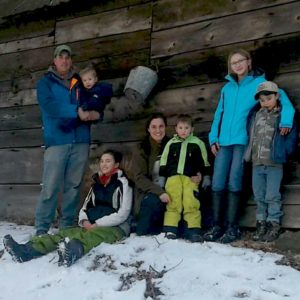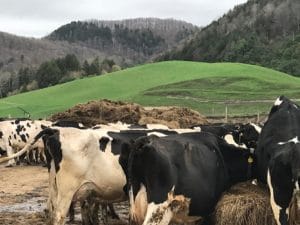Kids, Cows and Conservation at Vermont’s Chapman Family Farm
By Rebecca Harris
In 1914, Sylvestor Howe packed up his horses, left behind his family and small brick house in Tunbridge, Vermont, to travel 90 miles to the big city of Brattleboro. He would return weeks later with the town’s first registered Holstein cows to start Holstein Stock Farm. Nine of the Howe children would grow up on this farm, and six would die on the same land.
Tucked in-between rolling green hills carved by the winding first branch of the White River, the pastures are kept small in this valley. It isn’t hard to imagine the echoed clacking of hoofs over the wooden covered bridge that still acts as the sole access to this farm’s narrow green pasture. Over the years the farm was passed down from one generation to the next. Two years ago Tunbridge-born, military veteran, beginner farmer, Corey Chapman and his wife Ann bought this 200-acre organic dairy farm from Merle Howe, the last living son of the original Howe family, to start Chapman Family Farms.
When Corey Chapman grew up here, there were 25 dairy farms in town. Today only five organic dairy farms are left. Increasingly, Vermont’s idyllic agricultural lifestyle is threatened. NRCS’s Agricultural Conservation Easement Program, Agricultural Land Easements (ACEP-ALE) helps protect threatened agricultural landscapes and their rich history for future generations.

On the Chapman farm, water quality is a focus and the family received assistance through the NRCS Environmental Quality Incentives Program (EQIP) to install practices to protect and improve soil and water health. Sixty acres of the 204-acre farm are conserved through a conservation easement with the Vermont Land Trust.
In partnership with the USDA-Natural Resources Conservation Service (NRCS) and Vermont Land Trust, the Chapman’s conserved 60+ riverside acres of the farm in perpetuity with an Agricultural Land Easement. In 2018, NRCS celebrates 25 years of partnering with passionate private landowners, such as the Chapman Family, to protect and prevent the development of productive agricultural land.
Unlike Corey, Ann spent the majority of her life in cities, spending her teenage years in Boston and traveling around the world as a student and young professional. “I’ve lived in cities most of my life, in places where you have to walk a couple of blocks to go see the grass they planted.” She understands the importance of maintaining working lands and raising children on a farm and explains, “I’ve seen a lot of places in the world where you had to go on vacation to see Mother Nature, where kids learn about farm animals from storybooks.”
She says protecting this land means connecting the next generation to “our rivers and our soil.” She says, “The best way to protect a river is to let kids swim in it. If they grow up swimming in a river, they are going to love that river. They are going to get angry when banks are eroding, they are going to get mad when there is erosion, they will be concerned when there is trash lodged in the banks and when there are no fish. For the rest of their life, they are going to be protective of that resource.”
When the Chapman’s enrolled their riverside farmland in a state supported River Corridor Easement (an easement that allows for the passive restoration of the channel and for reforestation) they did so with one exception. Part of the conservation plan included land set aside for Ann’s Beach, where their family and others could still access, and play, in the river.

The Chapman family, including their five children (with one on the way!), are passionate about conservation and stewardship. Ann says, “If we are going to farm, we are going to do it right from the beginning.”
When asked how they envision the future, Corey and Ann tell a story from the days following Corey’s return from his third and last stint in Afghanistan. They sat down and asked each other what kind of life they wished to lead. Corey spoke with intention, “I don’t care if we are dirt poor and have nothing–this is our dream. We want to wake up every morning and see our children.”
Corey then turned and pointed to a framed photo hanging on the wall of a man in uniform, his late best friend Steve, and says, “When it’s 31 below zero and I cannot go any longer, I remember that he was 25 when he died and now I’m 38. I am able to do whatever it takes to protect this land for my children. However, if they watch me walk through the door every day and the guy from the state is here because the river is polluted, they’re not going to want to continue farming.” Passing on this land should be a blessing, not a burden. That means investing in sustainable infrastructure such as a new manure pit or a larger bunker silo. It means thinking about how your farming practices will impact the future of the land. “We still complain … its human nature to complain, but at the end of the day we’re extremely lucky. I’m lucky to be alive.”
With the help of NRCS’s ACEP-ALE, one hundred years from now, the narrow covered bridge may still act as the only access to the farm’s narrow pasture, dotted with Holstein cows. Red maples lean over verdant riverbanks, their roots holding back the soil and filtering runoff. Ann’s Beach is filled with new children playing in the river, future farmers and conservationists learning to love the land.
Rebecca Harris is working for the USDA Natural Resources Conservation Service in Colchester, Vermont through EcoAmeriCorps, as a Conservation Easement Stewardship Assistant. She earned her Bachelor of Arts degree in Environmental Studies and Political Science from Tulane University in 2016.
For more information about NRCS’ Agricultural Conservation Easement Program (ACEP), which provides financial and technical assistance to help conserve agricultural lands and wetlands and their related benefits, visit https://www.nrcs.usda.gov/wps/portal/nrcs/main/national/programs/easements/acep/.



Are you related to Throope Chapman, Benjamin C or Welcome Chapman from Readsboro Vermont?
We are decendants and live in Utah. My email is jhc1717@comcast.net
Janet Chapman